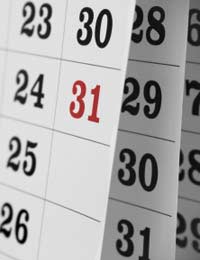Time, Date and Days of the Week

Once you have mastered some very basic vocabulary for sign language you will want to expand on it. A natural progression from basic introductions and that sort of things is to learn the words for telling the time saying dates and days of the week. Then you can begin to form sentences about what time to meet, when you are doing things and future plans.
Time
Words pertaining to the time are always useful. Once you know them you can arrange to meet up with friends at a set time or say at what time something happened. Numbers are portrayed in the usual way, with finger spelling shapes. But others words which are used for the time are more complex and are also useful to know in order to be able to make plans. When trying to tell the time, you need words such as to and past so that you can say quarter, or fifteen, past and half, or thirty, past. The word to, when talking about time is the primary hand pointing across the body and moving forwards. To say past in a time context, the primary hand is held upright and then flops over at the wrist. Others time-related words you might need include afternoon, which is said by holding two fingers to your chin and bringing them down in a downward arc. Morning is said by pointing at the opposite shoulder and then at the shoulder the same side as the finger. Evening is portrayed by two fingers being held to the forehead and then moved to the chin.Date
Months all have their own sign but most are done from a finger spelling basis and therefore are too complicated to describe. Most months use their initial letter as the basis and then add something afterwards to distinguish them form other months which use that same letter. Seasons are also useful for showing the date. Winter is said by holding arms at sides and making a slight shivering motion. Spring is said by holding one arm horizontally, palm inward and moving the other arm up behind it in an arc. Summer is putting the hand to the forehead and flicking it away, as if to indicate how hot it is. And autumn is portrayed by holding up one hand with the thumb out and zig zagging the other hand down from it – like falling leaves.Days of the Week
Days of the week will always come in useful, from your teacher arranging the next class to asking someone when they want to meet up. And the seven signs for the names of the days of the week are short and easy to remember. Sundays sees the speaker clap their hands together twice. Monday is the sign for M tapped twice on the hand. For Tuesday, the index finger jabs the palm of the other hand twice. For Wednesday, the sign is the W sign twice, so fingers interlock, come apart and then interlock again. Thursday is T followed by H, that is, the index finger touching the base of the opposite hand followed by the palms skimming across each other. Friday is simply the index and middle fingers of one hand tapping the same fingers on the other hand. And finally, Saturday is the prime hand rubbing the back of the other hand while they are facing the chest.Once you have mastered these few words, your vocabulary will be allowing you to carry out simple tasks and hold very basic conversations. This article uses the words as they are in British Sign Language to avoid confusion, although where finger spelling is used this is much the same wherever you are and whatever sign language you use.
Related Articles in the 'Signing Basics' Category...
- Sign Language Vs Pidgin - Which is Most Complex?
- The Relationship Between Sign Language and Mime
- Can Baby Signing Really Help My Child's Development?
- Signing About the Weather
- Transport and Holidays
- Personal Information
- Sports and Hobbies
- Around the Home
- Everyday Tasks
- Finger Spelling
- Getting to Know One Another
- Greetings and Introductions


Re: The Importance of Establishing Home Alerts For Deaf People
Kak esehiko sminor k112 signedlanguage.co.uk
Re: The Listening Bus
Hi, We would like to book the listening bus for our school community. What is your availability for the summer term 2025? What are the costs? We…
Re: Sign Supported English
Ex Mary hare school. Love sign supported English as Aspie. More useful Less emotional As words Not emotion More helpful to deaf Aspies
Re: The Listening Bus
Hi, I am the inclusion leader and SENCo of a school with a specialist resource provision for deaf pupils within a mainstream school. Staff say…
Re: The British Sign Language Broadcasting Trust
I’m not effected in any way or suffer from any communication issues personally. I was curious as to why…
Re: Sign Supported English
I want a series of videos to learn SIGN SUPPORTED ENGLISH FOR BEGINNERS. Can you please help?
Re: Makaton
Hello We are a small pre-school and we are trying to teach all our children Makaton to help all of them communicate regardless of their own…
Re: Sign Supported English
Can anyone help me ? I am trying to find an SSE class or lessons in Kent and have had no luck. Failing that, are there any publications I…
Re: Hands on Signing
Hi I have a blind child and he has a moderate hearing loss. I wonder if you can help me to teach him sign language and I need to learn as well.…
Re: Sign Supported English
Does anyone know of any programmes or resources for using SSE with older people whose hearing has deteriorated in later life?